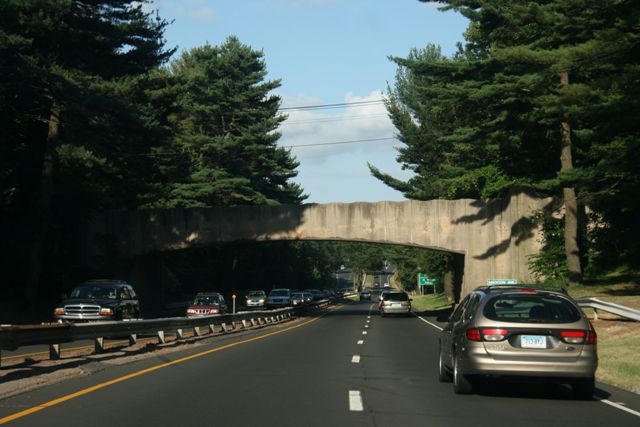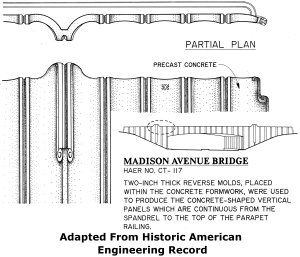We Recommend:
Bach Steel - Experts at historic truss bridge restoration.
BridgeHunter.com Phase 1 is released to the public! - Visit Now
Madison Avenue Bridge

Primary Photographer(s): Nathan Holth and Rick McOmber
Bridge Documented: July 13, 2008
Bridgeport: Fairfield County, Connecticut: United States
1939 By Builder/Contractor: Mariani Construction Company of New Haven, Connecticut
Not Available or Not Applicable
79.8 Feet (24.3 Meters)
81.0 Feet (24.7 Meters)
30.2 Feet (9.2 Meters)
1 Main Span(s)
747

View Information About HSR Ratings
Bridge Documentation
View Archived National Bridge Inventory Report - Has Additional Details and Evaluation
View Historic American Engineering Record (HAER) Documentation For This Bridge
HAER Data Pages, PDF
View Historic American Engineering Record (HAER) Documentation For The Merritt Parkway
HAER Drawings, PDF - HAER Drawings, High Resolution PDF - HAER Data Pages, PDF

About The Merritt Parkway
The Merritt Parkway, the first divided limited access highway in Connecticut, is one of the most unique and historically significant highways in the United States. The roadway was designed to combine the beauty of a parkway with the function of a limited access highway. As such, it is an early example of a limited access highway, and a unique example of one which also includes aesthetics as a major design consideration. This design consideration is no more clear than it is with the bridges of the Merritt Parkway. Each bridge is unique, with no two bridges identical. While some other early parkways and limited access highways included aesthetic design in their bridges, the Merritt Parkway stands out as a large, complete, and well-preserved example. In addition, its bridges display a far wider diversity in design and aesthetic treatment from bridge to bridge than other similar roadways which the Merritt Parkway might be compared to. A large number of the bridges on the Merritt Parkway remain today well-preserved and not demolished. However it is true that some bridges have been demolished and replaced, some mimicking the original bridge's design, and others do not.
About The Bridge
This bridge is one of the many historic bridges along the Merritt Parkway. Each one has unique architectural detailing that is extensive enough that it is often hard to remember that most bridges are all the same bridge type, a concrete rigid frame. The few other bridge types include steel frame/deck girder, and concrete arch. The Madison Avenue Bridge is one of the more unusual and distinctive bridges on the Merritt Parkway. The shallow arch and lack of differentiation between railing and superstructure give this bridge a very thin and streamlined appearance. The bridge retains excellent historic integrity.
HistoricBridges.org Merritt Parkway Bridge Documentation
In 2008, HistoricBridges.org traveled the Merritt Parkway
and using a high-speed DSLR camera, collected a series of elevation overview
photos of a large portion of the historic Merritt Parkway overpass bridges,
taken from a moving car. Time constraints did not allow for a full
photo-documentation of the bridges. As such, only a handful of photos for
each bridge is currently available on this website. These photos help
document the historic Merritt Parkway as a whole, and provide a framework
for a full photo-documentation of the Merritt Parkway Bridges in the future,
and also compliment the existing Historic American Engineering Record (HAER)
documentation for the Merritt Parkway and its bridges. HAER has already
completed an extensive documentation which includes measured drawings of the
bridges and a massive 100+ page historical narrative, all contained within
HAER's Merritt Parkway page. The link is available above. In addition, HAER
also completed individual documentation for many of the bridge structures on
the Merritt Parkway.
The HistoricBridges.org HSR Rating applies to
the bridge structure as an individual structure, and does not consider its
significance as a part of the Merritt Parkway highway and associated greater
group of bridges. The HSR Rating would be much higher for each bridge if
this were taken into account, since the Merritt Parkway is one of the most
important historic highways in the country, and the bridges are one of the
main parts of the highway.
This bridge is tagged with the following special condition(s): Merritt
![]()
Photo Galleries and Videos: Madison Avenue Bridge
Bridge Photo-Documentation
Original / Full Size PhotosA collection of overview and detail photos. This gallery offers photos in the highest available resolution and file size in a touch-friendly popup viewer.
Alternatively, Browse Without Using Viewer
![]()
Bridge Photo-Documentation
Mobile Optimized PhotosA collection of overview and detail photos. This gallery features data-friendly, fast-loading photos in a touch-friendly popup viewer.
Alternatively, Browse Without Using Viewer
![]()
Maps and Links: Madison Avenue Bridge
Coordinates (Latitude, Longitude):
Search For Additional Bridge Listings:
Bridgehunter.com: View listed bridges within 0.5 miles (0.8 kilometers) of this bridge.
Bridgehunter.com: View listed bridges within 10 miles (16 kilometers) of this bridge.
Additional Maps:
Google Streetview (If Available)
GeoHack (Additional Links and Coordinates)
Apple Maps (Via DuckDuckGo Search)
Apple Maps (Apple devices only)
Android: Open Location In Your Map or GPS App
Flickr Gallery (Find Nearby Photos)
Wikimedia Commons (Find Nearby Photos)
Directions Via Sygic For Android
Directions Via Sygic For iOS and Android Dolphin Browser
USGS National Map (United States Only)
Historical USGS Topo Maps (United States Only)
Historic Aerials (United States Only)
CalTopo Maps (United States Only)


